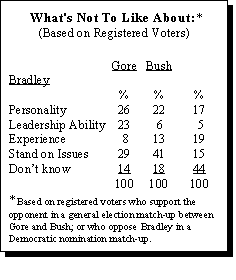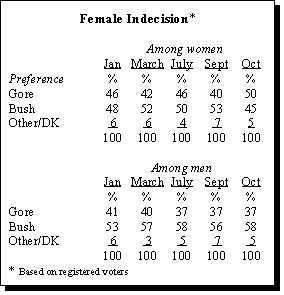Introduction and Summary
Even though Americans say that issues matter most, candidates’ personal qualities may be decisive in a campaign without dominant issues. Voters make fine distinctions, however, about what they want to know about candidates personally.
Americans strongly reject press inquiry into most avenues of candidates’ private lives, yet at the same time place high priority on knowing certain things about them personally. Fully 82% say it is very important to learn about a candidate’s reputation for honesty, and almost as many (71%) say the same about getting a sense of how well they connect with average people.

Such judgements stand behind the most surprising development in the campaign so far — lack of public support for Al Gore. Criticisms of the vice president’s personality and leadership ability are often cited as reasons for not supporting him in favor of Republican frontrunner George W. Bush. They are also given by Democrats who prefer his rival Bill Bradley for their party’s nomination. In fact, almost as many voters cite Gore’s own personal shortcomings (38%) as his ties to Clinton (49%) as a reason for non-support in a two-way match-up with Bush. (See table page 3.)
Candidate criticisms are less often given as reasons for not backing Bush or Bradley. Bush’s positions on issues is his big negative, while many voters don’t know enough about Bradley at this point to cite a specific reason for not supporting him.
The nationwide Pew Research Center poll, taken after the debut of Gore’s more assertive campaign, found that the vice president has pulled marginally closer to Bush in a general election ballot test. He currently trails the Texas governor by 7 percentage points (44% to 51%), compared to an 11-15 percentage point deficit in three previous surveys. The poll did not find Gore losing more ground against Bradley as he had in Pew’s September survey. He leads the former NY Knick and New Jersey senator by a margin of 60% to 31% among Democrats and Independents who lean Democratic, compared to 58%-32% a month ago.
No single issue or group of issues emerge as overarching concerns to voters, and there are few specific policy issues that many voters say they have heard a lot about. Proposals to provide health insurance to the uninsured is one of the few policy problems that has the potential to rouse voters. News interest in recent candidate proposals to deal with this problem ran high, and it tests as one of the few issues that majorities say they would like to hear the candidates discuss, according to the survey of 1,032 adults conducted October 7-11, 1999. The poll has a margin of error of plus or minus 3.5 percentage points.
A 57% majority said they paid attention to news about candidate proposals to extend health insurance to the uninsured — with 24% following very closely and 33% fairly closely. In contrast, overall interest in the campaign remains modest. Just 17% said they paid very close attention to general campaign news and fewer than half followed it at all (49%).
In addition to the interest in health insurance, the poll found a 56% majority saying it is very important to hear about candidate positions on the use of American forces in humanitarian interventions. Many also gave high priority to knowing about a candidate’s stand on proposals to shore up Medicare (50%) and whether to privatize some portion of Social Security funds (46%).
A Wobbly Gender Gap

The latest Pew Research Center survey suggests women may be having a harder time than men making up their minds about whom to vote for. Increased support from women accounts for much of Gore’s slight gain in the general election match-up over the past month — 50% would vote for Gore today compared to 40% in September. Among men, support for Gore remains unchanged from last month at 37%. Indeed, most of the movement in the contest between Gore and Bush throughout 1999 has been associated with shifts in support among women voters. Support for Gore among women has fluctuated between a 13-point deficit to Bush in September and the 5-point lead he enjoys today. In contrast, men have consistently supported Bush over Gore by 12 percentage points or more throughout the year.

The vice president’s marginal gains in the general election match-up with Bush come despite a lack of public enthusiasm for him personally. Only 17% of those who back him like his personality and leadership most. Three-in-ten (29%) say the same of Bush. For both candidates, support in the general election hinges largely on their positions on the issues. Nearly half of Bush supporters and Gore supporters say the candidate’s stand on the issues is what they most like (47% for each). More than one-in-four who support Gore like his experience most, compared to 16% of Bush supporters.
Gore’s personal image is less of a problem with women than men. Nearly one-in-four women (23%) who would vote for Gore cite either his personality or leadership as the quality they most like about him, compared to just 9% of men who choose leadership and none who cite his personality.
Fatigue Still a Factor

Gore’s connection to Clinton continues to challenge his run for the presidency. When asked which factor — Gore’s personality and leadership ability or his ties to the Clinton administration — is the more important reason for not supporting the vice president, half (49%) say his ties to the administration. Gore’s personal qualities are the most important factor for 38% of those who don’t support him. On the other hand, 60% of voters who support the vice president do so because of his personality and leadership, with half this number (30%) citing ties to the administration.
The impact of Clinton fatigue on Gore’s performance with the voters is greatest among Republicans, 61% of whom cite ties to the administration as the more important reason for not voting for Gore. But it is also apparent among Democrats and Independents who favor Bush over Gore: 38% cite ties to Clinton, while 44% point to problems with Gore’s personality and leadership.




